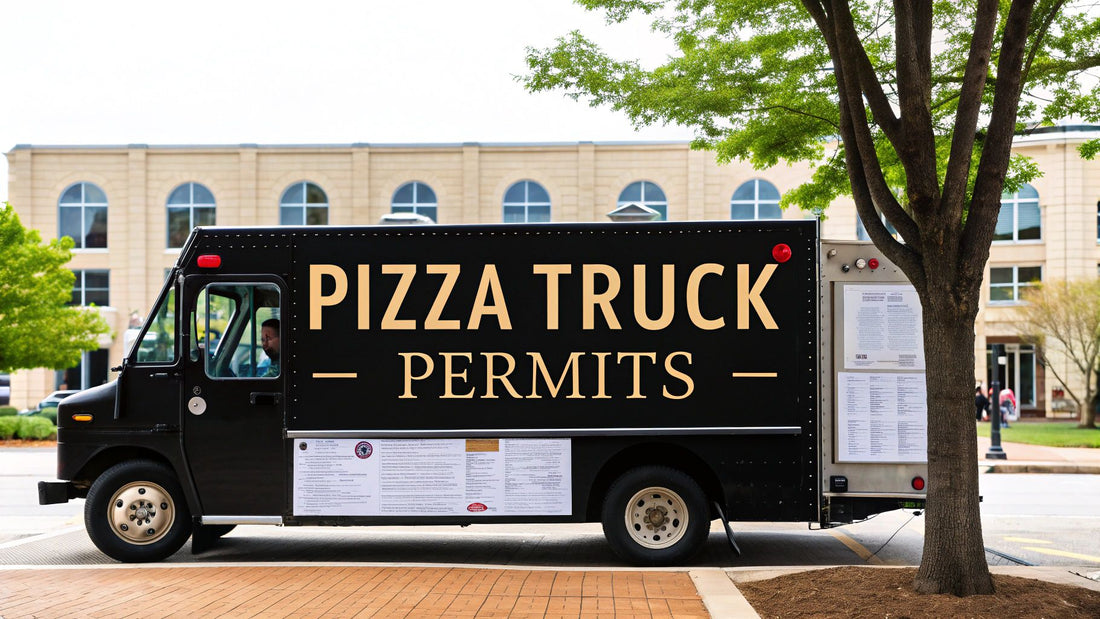
Pizza Food Truck Permit Requirements Guide
Share
Getting a pizza food truck on the road involves slicing through a whole lot of red tape. Before you can legally serve a single slice, you'll need to collect a stack of local, state, and federal permits. This isn't a one-and-done deal; it's a process of getting approvals for everything from your business entity to the specific gear you use, like your pizza prep table. Nailing these food truck permit requirements from the very beginning is the secret to a smooth launch.
Charting Your Course Through Pizza Truck Permits
The dream of running a mobile pizza business is amazing, but let's be real—the initial paperwork can feel like a nightmare. The best way to think about the permit process isn't as a roadblock, but as the foundation for a business that's built to last. Every single requirement is there for a reason, mostly to protect public health and keep the business landscape fair.
For a pizza truck, inspectors are going to zoom in on your high-temperature oven and your refrigerated pizza prep tables. These two pieces of equipment are at the heart of both fire safety checks and health department inspections.
This graphic gives you a bird's-eye view of the typical approval process you'll be following.
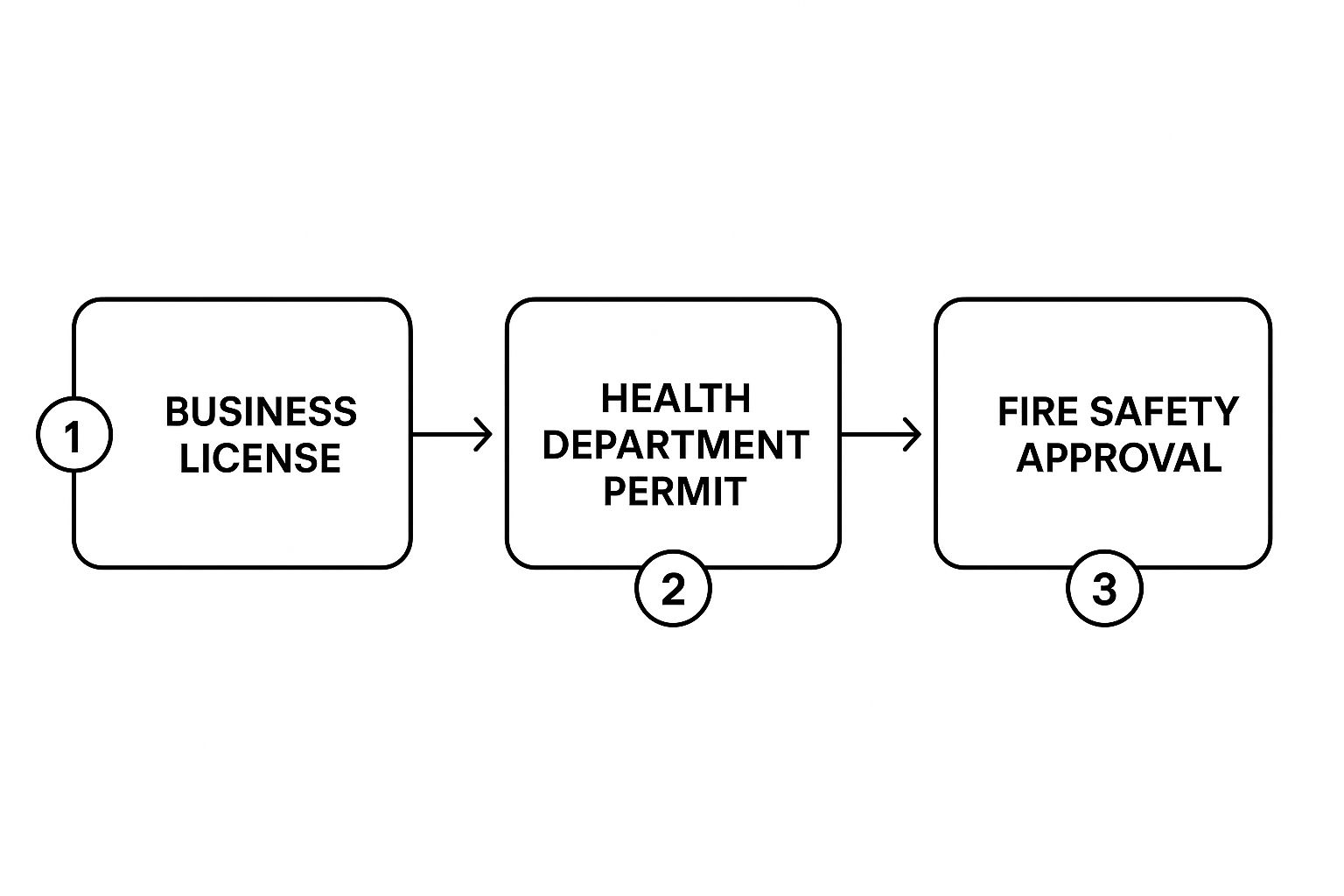
As you can see, getting that core business license is the first domino to fall. It opens the door to getting the health and safety approvals, which almost always depend on each other.
To help you get organized, here's a quick look at the most common permits you'll need for a pizza truck.
Key Permits for Your Pizza Food Truck
| Permit or License | What It Covers | Issuing Authority |
|---|---|---|
| Business License | General permission to operate a business in a specific jurisdiction. | City or County Clerk's Office |
| Health Department Permit | Ensures your truck and food handling practices meet public health standards. | County or City Health Department |
| Fire Department Permit | Certifies that your cooking equipment, especially the oven, meets fire safety codes. | Local Fire Marshal or Department |
| Mobile Vending License | Allows you to legally operate and sell from your truck in designated public areas. | City or County Licensing Department |
| Food Handler's Card | Required for all employees to prove they have basic food safety training. | Health Department or Certified Provider |
This table is just a starting point, as specific requirements can vary wildly from one place to another.
Understanding the Layers of Regulation
The world of food truck permits is notoriously hyperlocal. A permit that lets you operate in one city is often completely invalid just a few miles down the road in the next town over. This is why your initial research is probably the most important thing you'll do.
To keep all the moving parts straight, I highly recommend using a comprehensive due diligence checklist right from the start. It will help you make sure all your legal and financial bases are covered before you get too far down the road.
And this isn't a minor detail. In the United States, the average food truck needs six different regulatory documents just to operate legally. The whole process takes about 37 business days to complete before you can even think about firing up that oven.
Pro Tip: I tell every new pizza truck owner to create a master spreadsheet from day one. List every single town you might want to work in. Then, make columns for each permit you'll need: business license, health permit, fire inspection, vendor license, etc. Track your application dates, every fee you've paid, and—most importantly—the renewal deadlines. This sheet will be your bible.
Why Your Pizza Equipment Matters to Inspectors
When an inspector steps onto your truck, they're looking for risk. For a pizza restaurant business, that boils down to two things: heat and cold.
- Fire Safety: Your pizza oven is the main event. Whether it's gas or wood-fired, inspectors will check that it's installed with proper ventilation, has a fire suppression system in place, and is a safe distance from anything that could catch fire.
- Food Safety: Your refrigerated pizza prep table is the command center for your cold ingredients. Health inspectors will verify that it holds a consistent temperature below 40°F. This ensures your cheese, meats, and veggies stay out of the temperature "danger zone."
At the end of the day, getting your pizza truck permitted is a game of careful planning and detailed documentation. If you understand why the rules exist and prepare your truck and your paperwork to meet them, you're setting yourself up for a launch that's smooth, successful, and 100% legal.
Securing Your Core Business Licenses
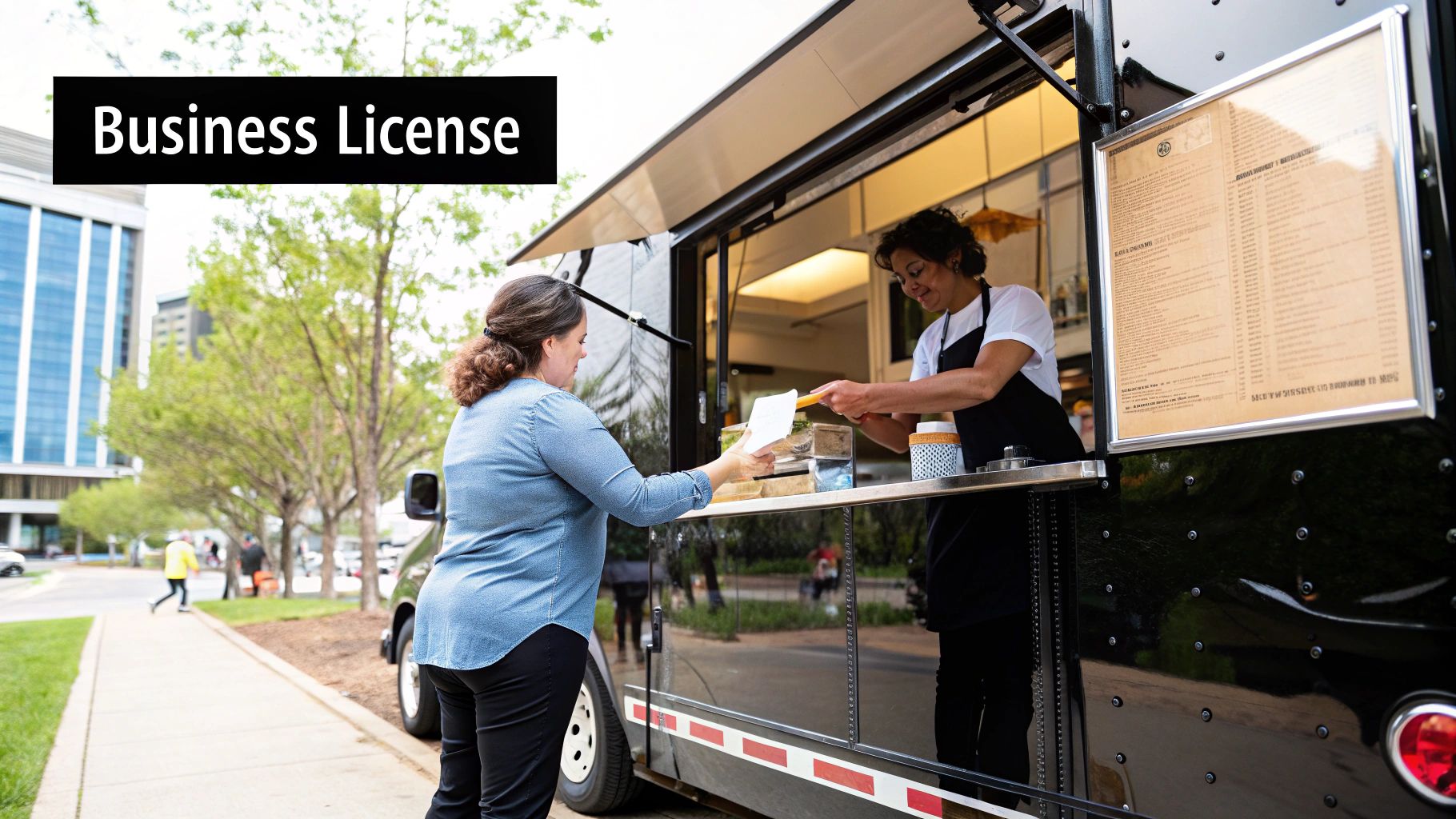
Before you even think about stretching your first pizza dough for a hungry customer, your pizza restaurant needs to be legit. This all starts with a handful of foundational licenses and permits that every single food truck—no matter what’s on the menu—absolutely must have.
Think of these less as bureaucratic hurdles and more as the concrete foundation for a real, sustainable pizza business. Getting these core documents in order is your non-negotiable first step. I've seen too many eager entrepreneurs try to cut corners here, only to face hefty fines or immediate shutdowns before they've even built a following.
The Universal Business License
Your first stop will almost always be your local city or county clerk's office to get a Business License. This is the most basic permission slip you need to operate any kind of company, from a tech startup to a mobile pizzeria. It officially registers your pizza truck as a legitimate entity in your home base of operations.
Honestly, without it, you can't open a business bank account, sign an agreement for a commissary kitchen, or even think about applying for the more specific health and fire permits. It’s the key that unlocks the entire process.
Your Federal Tax ID Number
Next up is your Employer Identification Number (EIN) from the IRS. This is basically a Social Security number for your business. A lot of new owners think, "I'm not hiring anyone yet, so I can skip this." This is a common and costly mistake for new pizza restaurants.
Even if you're a one-person show, you'll need an EIN for a few critical reasons:
- Opening a Business Bank Account: Most banks won't let you open a business account without one, and separating your personal and business finances is day-one stuff.
- Applying for Other Permits: Many state and local applications will ask for your federal tax ID right on the form.
- Hiring Staff: The moment you decide to hire that first person to help run the pizza prep table during a rush, you are legally required to have an EIN for payroll taxes.
Getting an EIN is free and you can do it online in just a few minutes. Don't put this one off.
The Authority to Collect Sales Tax
Every time you sell a pizza, you'll almost certainly need to collect sales tax. To do this the right way, you must have a Seller's Permit (sometimes called a Sales Tax Permit) from your state's revenue or tax agency. This permit is your official authorization to collect tax from customers and proves you’re set up to send those funds to the state.
Forgetting to apply for a seller's permit is a massive red flag for auditors. Operating without one can lead to back taxes, steep penalties, and interest charges that can absolutely cripple a new pizza business.
This paperwork is vital for your financial health and legal standing. It shows you're a responsible operator in what's become a booming industry. In fact, the global food truck market, valued at around $4.9 billion in 2025, is projected to rocket to $7.5 billion by 2032. With that kind of explosive growth, you can bet regulators are paying much closer attention to compliance.
Proving Your Food Safety Knowledge
Finally, we get to the Food Handler's Permit. This is a personal certification required for you and every single employee who touches food—from the person slicing pepperoni to the one boxing up the final pie. It's proof that your pizza restaurant team understands the fundamentals of food safety.
This certification covers the essentials, like:
- Proper handwashing techniques (you'd be surprised!).
- Preventing cross-contamination between raw sausage and ready-to-eat basil on your pizza prep table.
- Holding safe food temperatures for all your toppings and sauces.
When a health inspector shows up, they will ask to see these cards for everyone working on the truck. Making sure your team is certified isn't just about checking a box; it's about protecting your customers and your reputation. You’ll also find that a well-trained staff is way more efficient when it comes to organizing and using all the equipment your rolling kitchen needs.
Passing Health and Fire Inspections
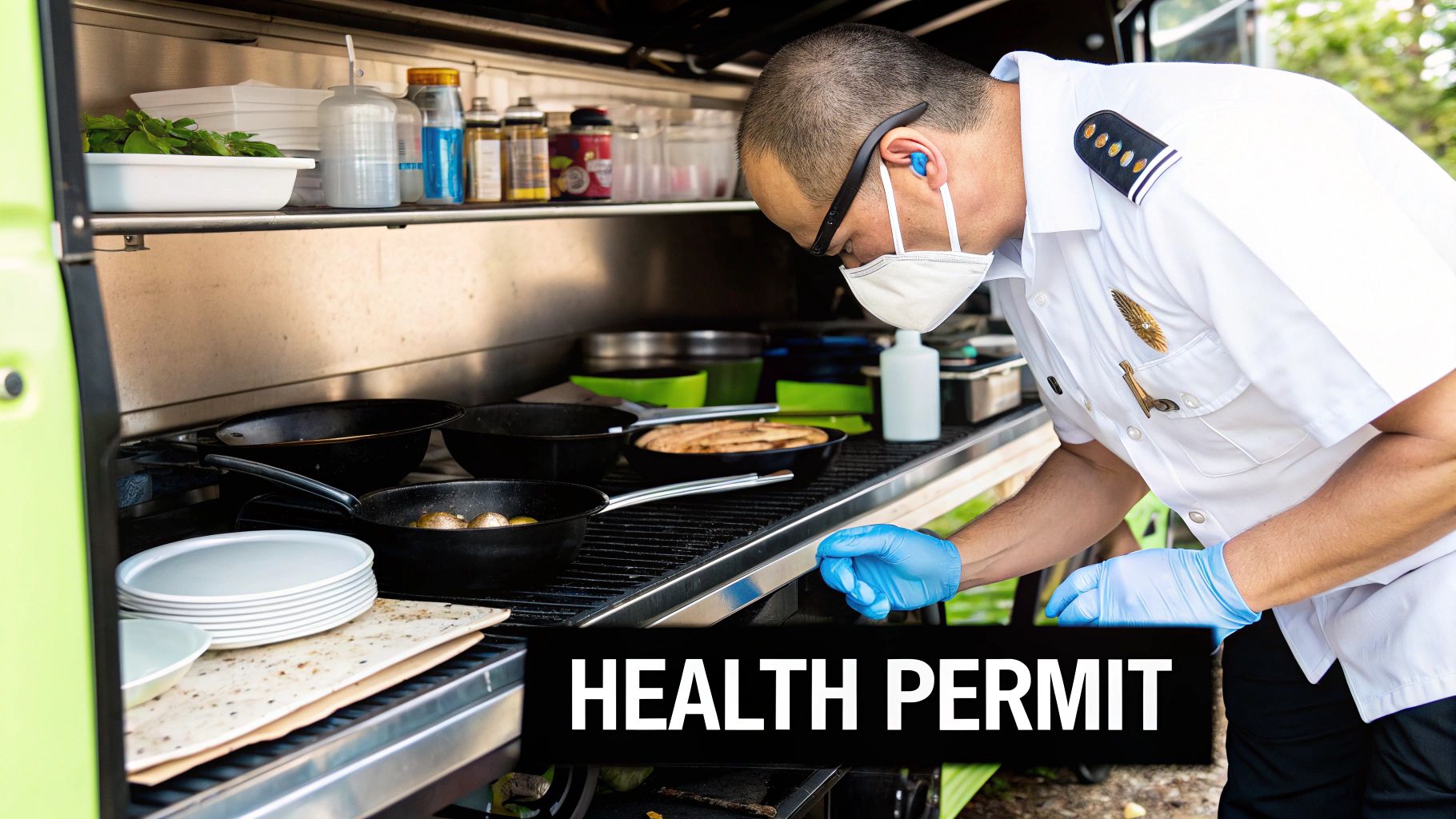
This is the moment of truth. After all the paperwork, planning, and build-out, the health and fire inspections are where your pizza truck gets put to the ultimate test. These aren't just formalities; they are rigorous evaluations designed to ensure public safety. A passing grade means you're cleared for launch, while a failure can lead to costly delays and rework.
For a mobile pizzeria, inspectors zero in on two critical areas. The health department focuses on your cold chain and sanitation, while the fire marshal is all about your high-heat cooking equipment. Think of them as two sides of the same coin—both essential for getting your pizza restaurant on wheels on the road.
Mastering the Health Department Inspection
When the health inspector steps on board, their immediate focus will be on your food handling and storage. Their goal is to prevent foodborne illness, and for a pizza operation, that starts with your refrigerated pizza prep table. This isn't just a workspace; it's the command center for food safety.
The inspector will have a very specific checklist. They will verify that your prep table's refrigeration unit can consistently hold all ingredients at 40°F (4°C) or below. They’ll likely use their own calibrated thermometer to check, so make sure yours is accurate.
From there, they'll examine your entire setup for proper sanitation protocols.
- Three-Compartment Sink: This is non-negotiable for washing, rinsing, and sanitizing utensils and small wares.
- Separate Handwashing Sink: It must be dedicated solely to handwashing and fully stocked with soap, paper towels, and hot and cold running water.
- Food Storage: All toppings in your pizza prep table must be in food-grade, covered containers. Raw meats like sausage or pepperoni have to be stored separately from ready-to-eat items like vegetables to prevent cross-contamination.
A common failure point I've seen is inadequate water capacity. Inspectors will check your fresh water and grey water tank sizes. The rule of thumb is that your wastewater tank must be at least 15% larger than your freshwater tank to prevent overflows.
Another key piece of your health permit puzzle is your relationship with a commissary kitchen. You cannot legally prep food—like making dough or sauce—in a home kitchen. You must have a signed agreement with a licensed commercial kitchen where you handle these tasks, store bulk ingredients, and dispose of waste. The inspector will verify this agreement.
Conquering the Fire Marshal's Checklist
While the health inspector is focused on cold, the fire marshal is all about the heat. Your pizza oven, whether it’s gas-fired or a traditional wood-burning model, is their number one priority. A fire inside a metal box on wheels is a serious risk, and they need to see that you've taken every precaution.
The fire suppression system is the first thing they will look for. It must be a commercial-grade system, typically an Ansul system, with nozzles aimed directly at your oven and any other cooking appliances. This system has to be professionally installed and certified annually.
Beyond the suppression system, proper ventilation is critical. A commercial-grade hood must be installed over the oven to vent heat, smoke, and grease-laden vapors safely outside. Poor ventilation is a fire hazard and an immediate red flag. To make sure your setup is fully compliant, it's worth learning the specifics of commercial kitchen ventilation requirements.
Your Pizza Oven and Fire Safety
The type of oven you choose dictates specific fire safety needs, and the inspector knows exactly what to look for with each one.
| Safety Requirement | Gas-Fired Oven | Wood-Fired Oven |
|---|---|---|
| Suppression | Ansul system required | Ansul system and Class K extinguisher |
| Clearance | Must have specified clearance from walls | Requires enhanced insulation and greater clearance |
| Fuel Storage | Propane tanks secured outside in a vented cage | Wood stored away from the oven and heat sources |
| Ventilation | Professional hood and exhaust fan | Hood with a spark arrestor on the chimney |
Passing fire inspections also involves you and your staff knowing basic safety protocols. Understanding how to operate a fire extinguisher is a practical skill that inspectors appreciate and may even ask you to demonstrate. Being prepared shows you take safety seriously, which goes a long way in building trust with officials.
Navigating Zoning and Parking Rules
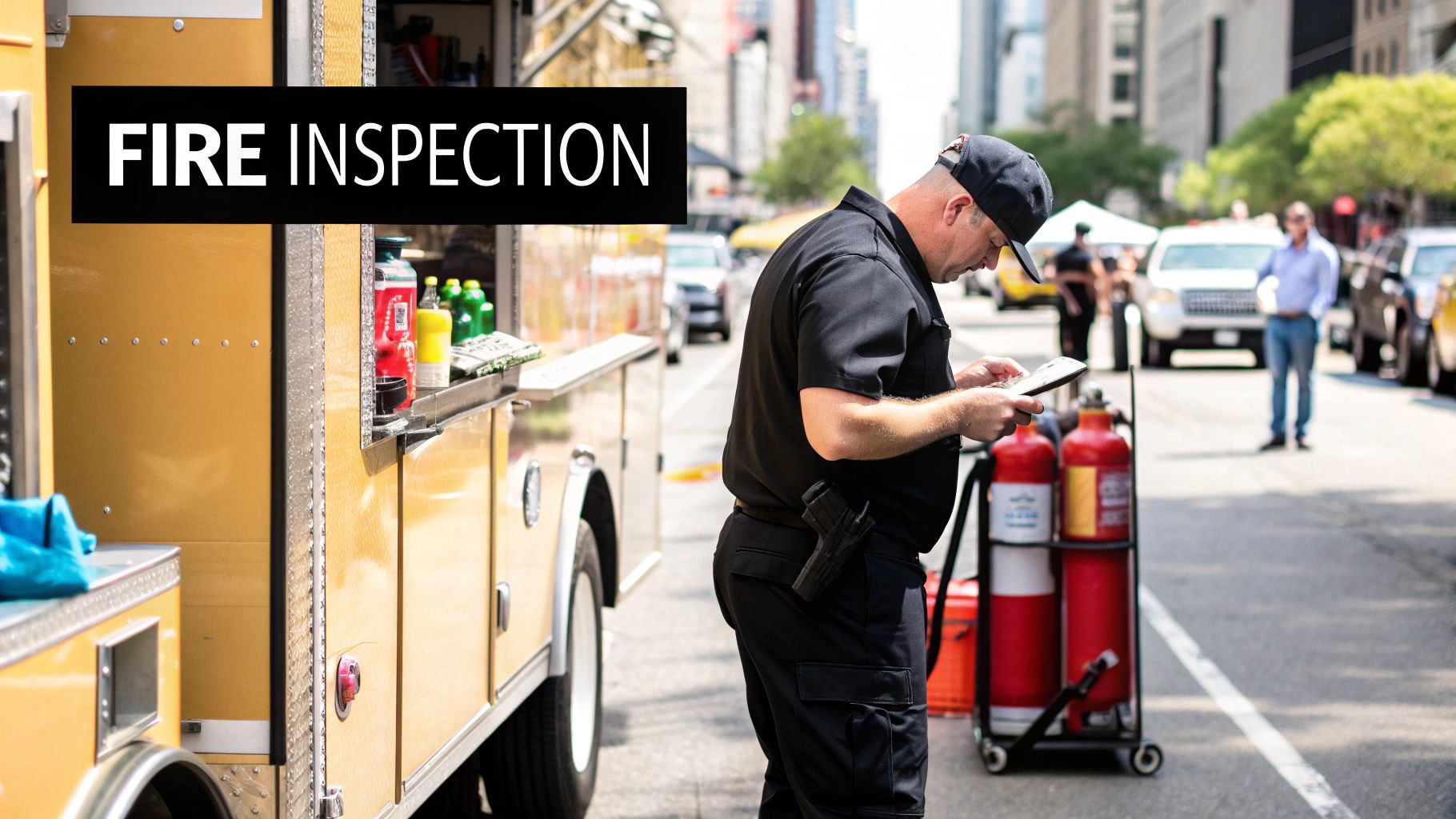
Getting your health and fire permits is a huge milestone, but it doesn't mean you can just park your pizza truck anywhere and start slinging slices. The next layer of the permitting process is the often-maddening world of zoning laws, parking rules, and the all-important commissary kitchen agreement.
Frankly, this is where many new pizza food truck owners get tripped up. Understanding these local rules is the difference between a killer day at a busy downtown spot and getting slapped with a hefty parking ticket that kills your profits. Every single city has its own quirky set of rules about where you can operate, when you can be there, and for how long.
Cracking the Code of Local Zoning Laws
Think of zoning laws as the invisible rulebook for commercial activity in your city. For food trucks, these rules can get incredibly specific. Your first mission is to become an expert on your city’s municipal code, which you can usually find online.
You'll want to hunt for sections on "mobile food vendors" or "transient merchants." This is where the city hides all the details that will make or break your pizza restaurant's business plan.
Here are a few common restrictions you’ll likely run into:
- Proximity Rules: A lot of cities have rules that keep you from setting up shop within a certain distance of a brick-and-mortar restaurant—often 300 to 500 feet. It’s meant to protect established businesses, so get out a tape measure and be precise.
- Time Limits: You might find that you can only stay in one spot for two to four hours before you have to pack up and move.
- Restricted Zones: Residential neighborhoods, school zones, and historic districts are often completely off-limits to food trucks.
A trick I learned the hard way: print out a city map and break out some highlighters. Color-code it. Red for no-go zones, yellow for areas with time limits, and green for prime vending spots. Having a visual guide is a lifesaver when you're planning your route for the day.
Public Vending vs. Private Events
Your pizza truck will probably live in two different worlds: public street vending and private catering gigs. Each one requires a completely different mindset when it comes to permits.
Public Street Vending is the classic food truck scene—parking on a public street and selling to anyone walking by. This is where you’ll need a specific Mobile Vending Permit from the city, and it usually comes with the tightest restrictions on location and hours.
Private Event Licensing is a whole other ball game. When you’re booked for a wedding, a company picnic, or a local festival, you’re on private property. You might not need that city street vending permit, but the event organizer almost always needs their own permit. They’ll need you to provide proof of your business license, health permit, and liability insurance. This is a huge advantage for pizza trucks, opening up revenue streams far beyond the curb.
The Critical Role of the Commissary Kitchen
For any legit pizza truck, the commissary kitchen is your home base. Health departments are almost universally against any food prep happening in a home kitchen. You absolutely must have a contract with a licensed, commercial kitchen, and the health inspector will want to see that paperwork.
This facility isn't optional; it serves several critical functions:
- Major Food Prep: This is where the real work happens. You'll be mixing big batches of dough, simmering gallons of your signature sauce, and prepping toppings for your pizza prep table.
- Secure Storage: Your commissary provides the approved dry storage for things like flour and canned goods, plus the walk-in cooler space for cheese and meats.
- Cleaning and Sanitation: It’s the only place you can properly wash and sanitize the big stuff that won't fit in your truck’s three-compartment sink.
- Servicing Your Truck: You’ll use the commissary to fill your fresh water tanks and, just as importantly, to legally dispose of your greywater and used grease.
Finding the right commissary is a make-or-break step. Look for one that’s used to working with food trucks. When you sign that agreement, make sure it clearly spells out the services you get, your hours of access, and the monthly cost. This contract is a foundational piece of your health permit application and proves you're running a professional, safe operation. An efficient commissary setup also directly impacts your service speed, which all comes down to how well your mobile workspace is organized. For a deeper dive on setting up for speed, check out these expert-approved food truck layouts.
Keeping Your Truck on the Road: Compliance and Renewals
Getting your pizza truck licensed and on the street is a huge win, but don't spike the football just yet. That was the starting line. The real game is the day-in, day-out grind of staying compliant with every single agency that has a say over your business.
This isn't about acing a single test. It's about building a rock-solid reputation for doing things the right way, every single day. That's what keeps inspectors happy and your pizza restaurant safely on the road, far away from fines and shutdowns.
Don't Get Blindsided by Renewals
Those permits you worked so hard to get aren't a one-and-done deal. Most of them, especially your health permit and mobile vending license, are on an annual clock. Miss a deadline, and you could be sidelined for days—or even weeks—while you scramble to get back in their good graces.
I’ve seen it happen. A great pizza truck operator loses out on a massive festival weekend because a permit expired on Friday afternoon. Don't let that be you. Set up a digital calendar and create alerts for every single renewal date.
I recommend setting reminders for 60, 30, and 10 days out. This buffer gives you plenty of breathing room to:
- Round up the paperwork: You'll likely need fresh copies of documents like your commissary agreement or certificate of insurance.
- Book necessary inspections: Some renewals, particularly for your fire suppression system, demand a new annual inspection and certification.
- Budget for the fees: Renewal fees are a predictable cost of doing business. Plan for them.
Always Be Ready for a Pop Quiz
Health inspectors rarely call ahead. Showing up unannounced is how they get a true snapshot of your daily operations. The only way to pass these surprise inspections is to make "inspection-ready" your normal state of being. This means turning best practices into unbreakable habits.
An inspector's first stop is often your pizza prep station. It’s where all the action happens, and it’s the first place they'll spot a compliance slip-up.
An inspector once told me, "I can tell everything I need to know about a pizza truck by looking at their prep table gaskets and the temperature log." That small detail speaks volumes about an operator's overall commitment to safety.
Your best defense is a simple daily checklist. Have your team run through it before the first pie goes out and after the last one is sold. It’s your own internal audit.
Your Daily Compliance Checklist
- Temperature Logs: Check and write down the temperature of your pizza prep table's refrigeration unit at the start of the shift, mid-day, and at close. It absolutely must stay below 40°F.
- Sanitation Stations: Is the handwashing sink stocked with soap and paper towels? Is the three-compartment sink set up with sanitizer mixed to the right concentration? Confirm it.
- Clean Surfaces: Sanitize every surface that touches food—prep table cutting boards, cooler door handles, utensils, you name it.
- Proper Food Storage: Make sure all your toppings are in covered containers. Raw meats should always be stored separately and below ready-to-eat veggies.
This isn't just about appeasing inspectors; it's about serving food you can be proud of. A customer who sees your commitment to cleanliness is a customer for life.
The Power of Good Paperwork
Beyond the daily checks, organized records are the backbone of long-term compliance. This paperwork is your proof that you’re running a tight ship, and it can be a lifesaver during an audit or a surprise visit.
Keep everything neat and accessible, whether it’s in a binder on the truck or in a shared cloud folder.
Your Compliance Binder Essentials:
| Document Type | What to Keep | Why It Matters |
|---|---|---|
| Sales & Tax Records | Daily sales reports, sales tax filings. | Shows you're collecting and remitting taxes correctly. |
| Food Safety Logs | Daily temperature logs, cleaning schedules. | Proves your due diligence to health inspectors. |
| Employee Files | Copies of Food Handler's Permits for all staff. | Verifies your team is properly trained and certified. |
| Maintenance Reports | Receipts for repairs, fire suppression system certifications. | Confirms your equipment is safe and in good working order. |
Staying on top of these details transforms compliance from a source of stress into a simple, professional routine. It protects your investment, builds your reputation, and ensures your pizza truck is set up to succeed for the long haul.
Your Top Food Truck Permit Questions, Answered
Let's be honest, navigating the world of food truck permits can feel like trying to read a legal document in another language. You've probably got the big picture down, but it's those small, nagging "what if" questions that keep you up at night.
This is where we get into the nitty-gritty. Getting straight answers to these common questions can be the difference between a smooth launch and a costly, frustrating delay. I've heard them all from aspiring pizza truck owners, so let's tackle the big ones head-on.
Do I Need Different Permits for My Pizza Truck in Other Cities?
Yes. Full stop. This is one of the most critical things to understand about running a mobile business. Permits are intensely local, and the license you have for one city is almost never valid just a few miles down the road in the next town. This isn't a small detail; it's a fundamental rule of the game.
If you plan on operating in multiple spots, you absolutely must research and get the specific mobile food vendor permits, health permits, and business licenses for every single municipality.
I have personally seen pizza trucks get shut down in the middle of a busy lunch rush for crossing a city line without the right paperwork. The best thing you can do is call the health and business departments for every single city or county you want to sell in before you ever park there. The fees and rules can be wildly different.
What Are the Specific Rules for My Pizza Prep Table?
Your pizza prep table is the heart of your operation, and you can bet the health inspector knows it. They are going to spend a lot of time looking at this piece of equipment. It has to be made from a smooth, non-porous material that's easy to clean and sanitize—think stainless steel.
Beyond the material, inspectors will zero in on these key features:
- Refrigeration: The built-in refrigerated compartments for your toppings must hold a steady temperature of 40°F (4°C) or below. You'll need a calibrated thermometer inside the unit to prove it's holding temp.
- Cleanability: The whole unit needs to be sealed to the floor or raised on legs high enough to clean underneath easily. They're looking for any hidden cracks or crevices where gunk can build up.
- Cutting Boards: All cutting boards must be removable and made from a material that can be properly sanitized.
Expect them to check every seal, test the thermometer's accuracy, and scrutinize the overall cleanliness. This piece of equipment is non-negotiable for keeping your food safe.
How Does a Wood-Fired Oven Change My Fire Permit Needs?
A wood-fired oven is an amazing centerpiece for a pizza truck, but it also introduces a whole new level of fire safety rules that go way beyond a standard gas oven. The fire marshal will have a completely separate, and much stricter, checklist for your setup.
For starters, you’ll need a Class K fire extinguisher within arm's reach, which is designed specifically for grease fires. Even more important, your truck must have a commercial-grade ventilation hood system installed over the oven opening that meets NFPA 96 standards. This is not something you can skip.
Other things they'll demand to see:
- Proper Insulation: The oven must be thoroughly insulated to protect the truck's walls and ceiling from the intense heat.
- Required Clearances: It has to maintain a specific amount of empty space away from any combustible materials inside the truck.
- Spark Arrestor: Your chimney must have a spark arrestor to stop hot embers from flying out and starting a fire.
The fire department will require a full, detailed inspection of your installation before they give you the green light. My advice? Always use a certified professional for this kind of work. It’s not the place to cut corners.
Can I Make My Pizza Dough and Sauce at Home?
This is a hard no. It's one of the fastest ways to get your pizza truck shut down for a critical health code violation. All food you plan to sell to the public must be prepped in a licensed commercial kitchen, which is known in the industry as a commissary.
Your home kitchen simply doesn't meet the tough health code standards for commercial food service. When you apply for your health permit, you will have to provide a signed agreement with a local commissary. This is where you'll do all your major prep work, store ingredients, get rid of your waste, and fill your water tanks. Trying to use your home kitchen can lead to an immediate shutdown and some very hefty fines.
Ready to build the heart of your mobile pizzeria? At Pizza Prep Table, we specialize in providing top-tier, NSF-compliant refrigerated prep tables that meet the strictest health department standards. Find the perfect unit to anchor your dream truck and ensure you pass your inspections with flying colors. Explore our selection today at https://pizzapreptable.com.
